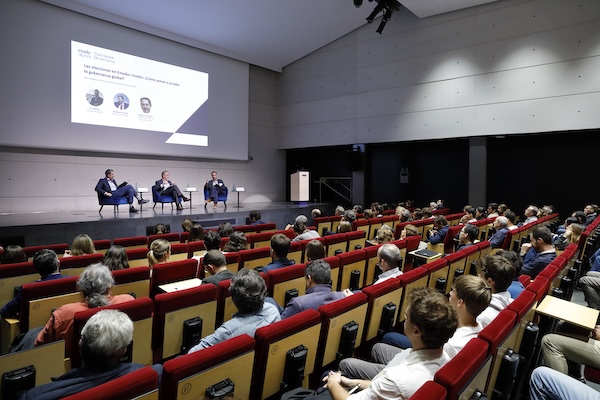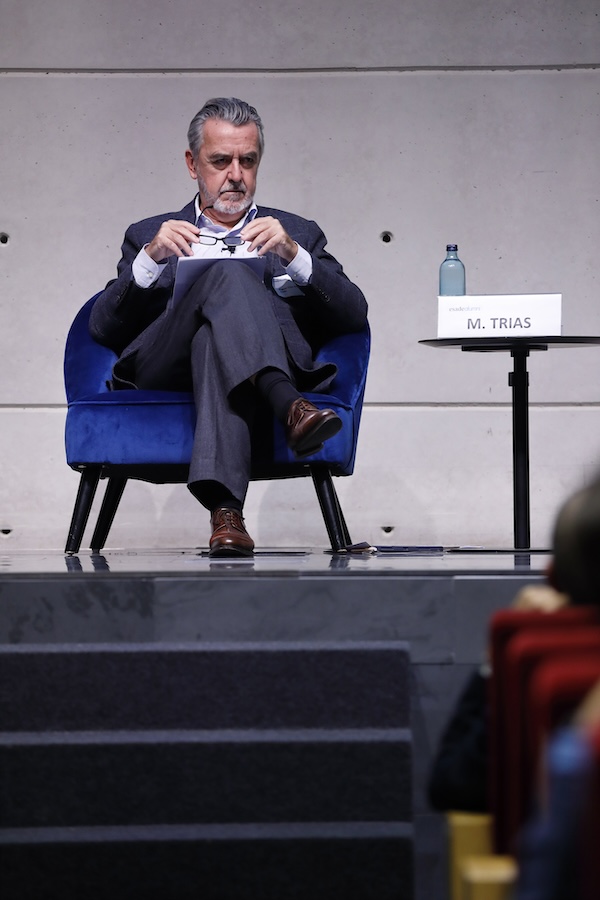This new meeting point aims to foster debate and reflection on geopolitical and global governance issues from both a legal and a business standpoint.

The launch of the new Esade Alumni Global Governance Club is a unique opportunity to further analyze the most pressing global challenges today. Thanks to this new meeting point, club members will be able to contribute to building a fairer and more sustainable world through debates, lectures, and networking, as well as to further explore issues like international relations, global governance, sustainability, and digitalization.
As an example, its opening event on October 28 served as the starting point for analyzing how the presidential elections in the United States may impact the international order in different spheres, like transatlantic relations, trade policy, the struggle against climate change, and armed conflicts. At the event, a space of dialogue was created on the topic “The United States Elections: How do they test global governance?” The dialogue featured the experts Pol Morillas, director of CIDOB (Barcelona Centre for International Affairs); Ángel Saz-Carranza, director of EsadeGeo (Center for Global Economy and Geopolitics) and Full Professor of Strategy & Policy at Esade Business School; and Miguel Trias Sagnier (MBA 89), academic sponsor of the Esade Alumni Global Governance Club, professor and chair of Business Law, former Dean of the Faculty of Law, and former president of Esade Alumni.

We speak with Miguel Trias Sagnier, academic sponsor of the Global Governance Club
- What is the main vision of the Esade Alumni Global Governance Club?
The club aims to become a referent in reflections on global governance and geopolitics, as well as contributing to its members’ professional development.
 - What are the club’s main goals for its first few years?
- What are the club’s main goals for its first few years?
We want to host debates on timely issues in this field that interest all alumni; contribute to forming opinions on the threats facing global governance and the ways to address them; interact with different Esade stakeholders (alumni, students, professionals, public administrations, and others) in order to analyze issues related to global governance; and help alumni in the Global Governance programs develop their professional careers through the exchange of ideas and opportunities and by fostering network.
- How does the club plan to contribute to the debate on global governance?
By attracting experts and politicians who have direct responsibilities in order to shape opinions via the exchange of ideas and proposals.
- In your opinion, what are the main geopolitical and global governance challenges we are facing today? How are they affecting us today and how will they continue to affect the future of companies?
The main challenge is coming from the crisis in the mechanisms of global governance (UN, IMF, World Bank, The Hague Court, WTO), as well as key agreements like the nuclear nonproliferation treaty and the struggle against climate change. These are being jeopardized on the one hand by the rise of new actors on the global scene, like China and the emerging countries (India, Brazil, and South American), and on the other by irresponsible politicians who only act according to their own interests of surviving in the public arena.
Companies are affected primarily by the new barriers arising, which are largely reversing the globalization process of the past 40 years and are translating into rises in tariffs, checks on foreign investment, and barriers to movements of capital and people.
- How should corporate governance adapt to these geopolitical challenges and stakeholders’ expectations?
Corporate governance should include geopolitical issues on its agenda, particularly companies that are more internationalised, given that their strategic decisions are increasingly conditioned by economic nationalism, which is emerging in many regions of the world. Likewise, they have to heed the demands of different stakeholders, particularly on environmental matters, climate change, equality, and human rights.



 - What are the club’s main goals for its first few years?
- What are the club’s main goals for its first few years?































